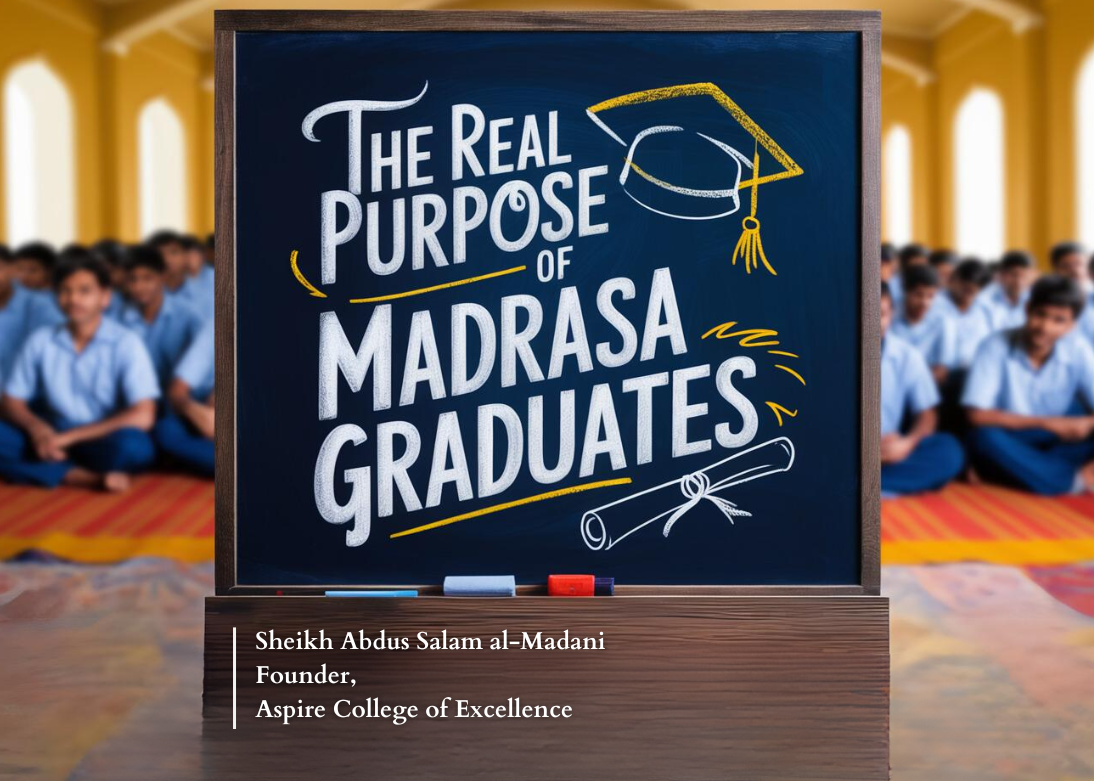
THE REAL PURPOSE OF MADRASA GRADUATES
Madrasas were never meant to produce imams, orators, and muezzins for the sake of money. The purpose of the Madrasa was to teach the basics of the religion and to create a religious-oriented generation, a generation whose hallmark would be simplicity and frugality, spreading peace and love, not longing for affluence and luxury, pursuing a lifestyle that focuses less on material possessions in spite of prosperity; a generation that cherishes the religion of Islam and gives top priority to safeguarding it on the Indian soil, even in the face of impoverished circumstances.
That's why in the era when dozens of colleges like Aligarh Muslim University, Jamia Osmania, Jamia Millia, and Jamalia College were established, magnificent buildings were constructed, and the financial condition of Muslims at that time was quite better than it is today. Similar magnificent madaris could have been built, but our wise elders, instead, built crude structures. They preferred sitting under the trees and teach the sayings of Allah and His Messenger.
The thatched roof of the Prophet's Mosque; the underprivileged students of the Suffah; the martyrs of Bir-e-Mau'nah; and the Scholars of Ra'jee were their role models. With stones tied to the stomach of the Messenger of Allah, the voice of
"وَمَا أَسْأَلُكُمْ عَلَيْهِ مِنْ أَجْرٍ ۖ إِنْ أَجْرِيَ إِلَّا عَلَىٰ رَبِّ الْعَالَمِينَ"
{And I ask no reward from you for it; my reward is from none other than the Lord of the Worlds} always kept stirring them up.
The officials of the Muslim colleges used to go after them seeking affiliation, and they refused, saying that we do not want to produce government servants; rather, we want to produce heirs of Abu Hurairah, Abu Dharr, Bukhari, Muslim, Abu Hanifah and Malik (May Allah be pleased with them all) who used to wash their clothes at night and wear them in the morning, never had a ride, and were exiled and flogged as a result of keeping their distance from the government!
Their passion was to such an extent that if someone from amongst them were to get a government job, they would not sleep because of the sorrow that they had lost a servant of God.
When the Scholars established Madrasas, they took care to see that the graduates should not be more attached to the world, simplicity and piety should be their identity, 'Prophet is sent to teach you your religion' their motto;
'انتم اعلم بأمور دنياكم'
the Prophet's comment, 'You know better your worldly matters' their hallmark; and the Prophet's saying, 'What have I to do with the world? I am like a rider who had sat under a tree for its shade, then went away and left it.' their message.
Conveyance is a part of faith. Despite a thousand differences, the fact cannot be denied that the services rendered in this cause by Qasim Nanotvi (may Allah have mercy on him), his students, and the graduates of his madrasah, Deoband, and its related institutions are hardly rendered by the graduates of any other school of thought. Even today, village after village, far away from the city, with no facilities, Qasmi or people affiliated with them are seen preserving the flickering lamp of Islam.
The modernists and their institutions, who are unaware of the purpose of religion, ridiculed the scholars as being "unaware of the status quo" and gradually pushed them towards specialising in worldly education, making them a concoction of religious and worldly entities. The unrealistic slogans of 'Aalim-Engineer' and 'Doctor-Aalim' were very attractive, and similar kinds of Madaris came into existence, whose graduates could neither sport a long beard nor shave it; were not comfortable in a turban nor could they style their hair; could neither wear a lungi nor wear shorts; could neither speak English nor Arabic; and could neither be an Imam nor do any business. In their search for so-called moderation and middle ground, they ended up becoming 'jacks of all trades and masters of none'.
A few decades ago, when the doors of the Saudi Universities were opened, even the Salafi Scholars did not like the Madrasa graduates going there. Moulana Ismail Gujranwala (may Allah have mercy on him) strongly opposed this, because of the apprehension that the luxurious and affluent lifestyles there will distract the steps of the graduates, and as a result, our Madaris, mosques, and centres will be left crying for the return of the graduates, and this apprehension was absolutely right.
The attraction of the riyals ruined the self-esteem of the graduates and their education to such an extent that the heirs of Bukhari and Ibn Taymiyyah were seen doing all kinds of menial jobs. It was not their difficulty but rather their lack of attachment to the real purpose of life, while their counterparts in India continued to live with dignity despite being financially weak.
A good number of batches of graduates from the Salafi school of thought continued to benefit from the universities of Saudi Arabia, and many of them became its residents, and those who could not go there, were spending their days in desire for the same! When some of them returned, they brought with them the luxury and grandeur of Saudi Arabia, along with their knowledge and methodology. They forgot the lesson of simplicity. The lesson of permissibility/concession greatly flourished. Based on the so-called permissibility/concession, the simplicity of the scholars in eating, drinking, dressing, habits, travel, etc. seemed to have vanished (Reh gayi rasm e Azan, Rooh e bilali na rahi). i.e., rituals were adhered to while lacking real spirit.
Conversation took the place of action, and speeches took the place of teaching. Instead of knowledge, popularity became the yardstick. Thus, the number of "scholar-like" leaders or "leader-like" scholars increased, while the number of humble, God-loving scholars declined. The standard of a successful scholar has completely changed. The Aalim who owns a car, travels on flights, and eats and drinks to his satisfaction is considered to be a successful scholar. Thus, the meaning of Madrasah and Aalim (the scholar) changed altogether.
Now, time and again, the questions that arise are: What is the benefit of madrasah? Why is its degree not recognised? Why is the curriculum not modern? Why is the value of maulvi so low? Where should the Maulvi go? They forgot the purpose of the Madrasah. No Madrasah official ever says that they will provide a job, while all reputed colleges promise to provide and/or get a good job.
Maulviyat is not an art, nor is it a profession or a business. Maulviyat is not an assurance of material comfort. Maulviyat is not a favour to anyone. Allah's religion does not need us. Allah clearly said: {And if you turn away, He will replace you with a people other than you, then they will not be like you}
The heirs of the Prophet forgot that their inheritance is knowledge, not dinars and dirhams. Maulaviyat is the inheritance of prophethood; the inheritance of the companions, the inheritance of the Imams, the inheritance of knowledge, the inheritance of self-control, the inheritance of self-respect, the inheritance of every sacrifice; and in compensation, only the inheritance of Allah's pleasure.
O Allah, keep alive for the sake of Your religion, give death in the cause of Your religion, and preserve the people of Your religion.
-Shaykh Abdus Salam Umari Madani
Founder,
Aspire College of Excellence (Chennai and Bangalore)
Ameer,
Jamiat Ahle Hadith, Chennai
Comments (0)
Categories
Recent posts
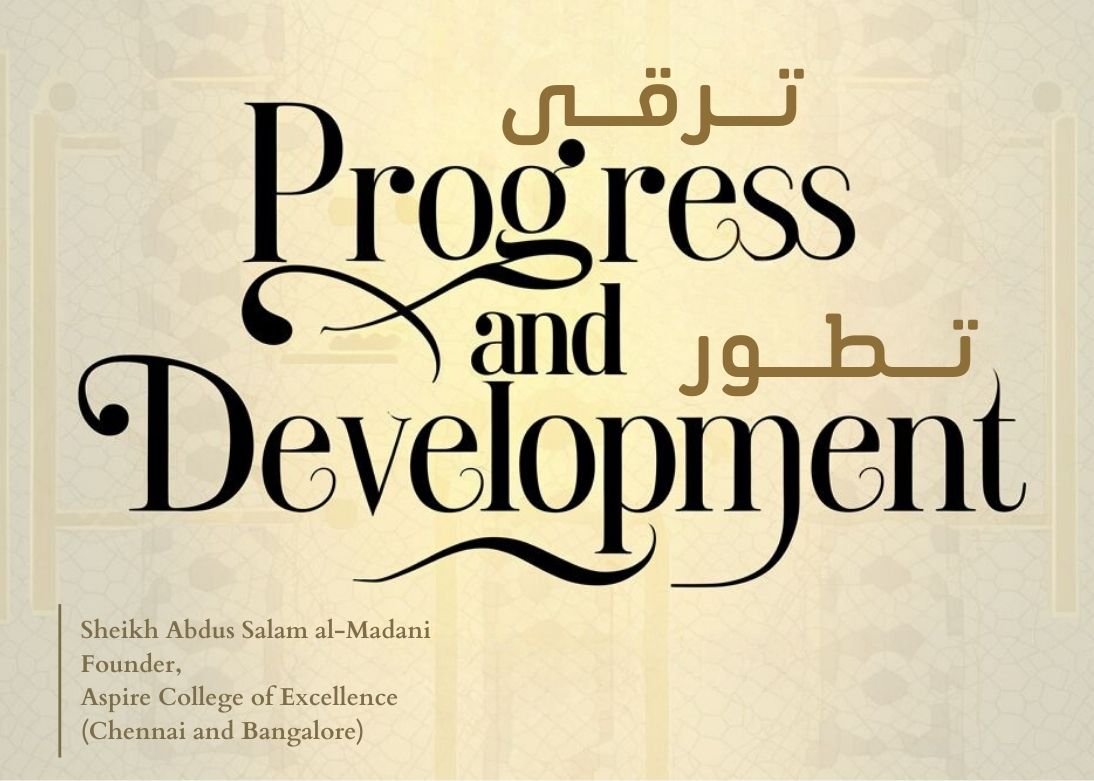
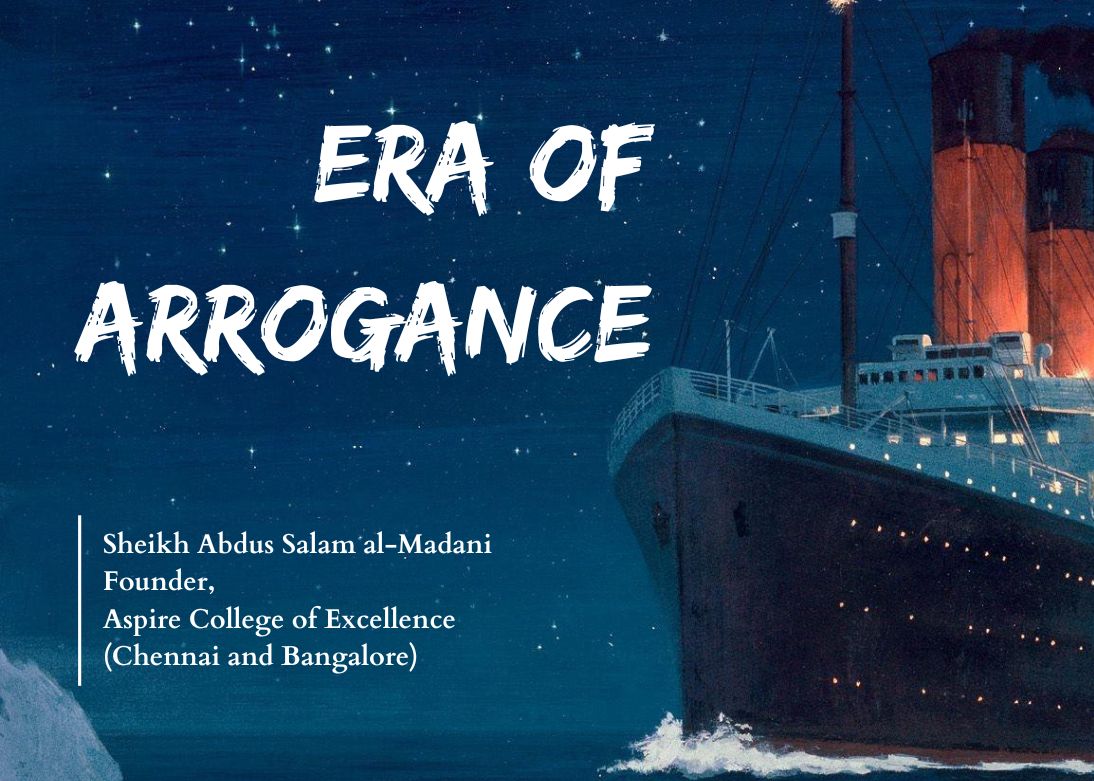
Era of Arrogance
6 Feb 2024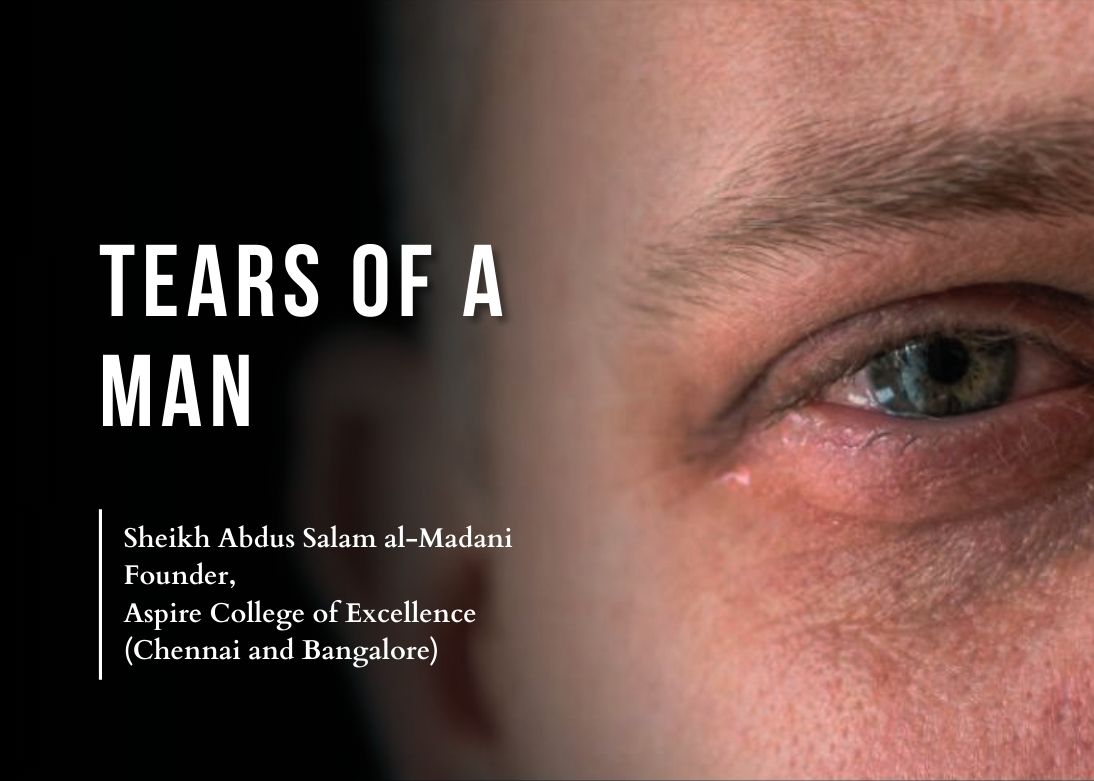
Tears of a Man
13 Feb 2024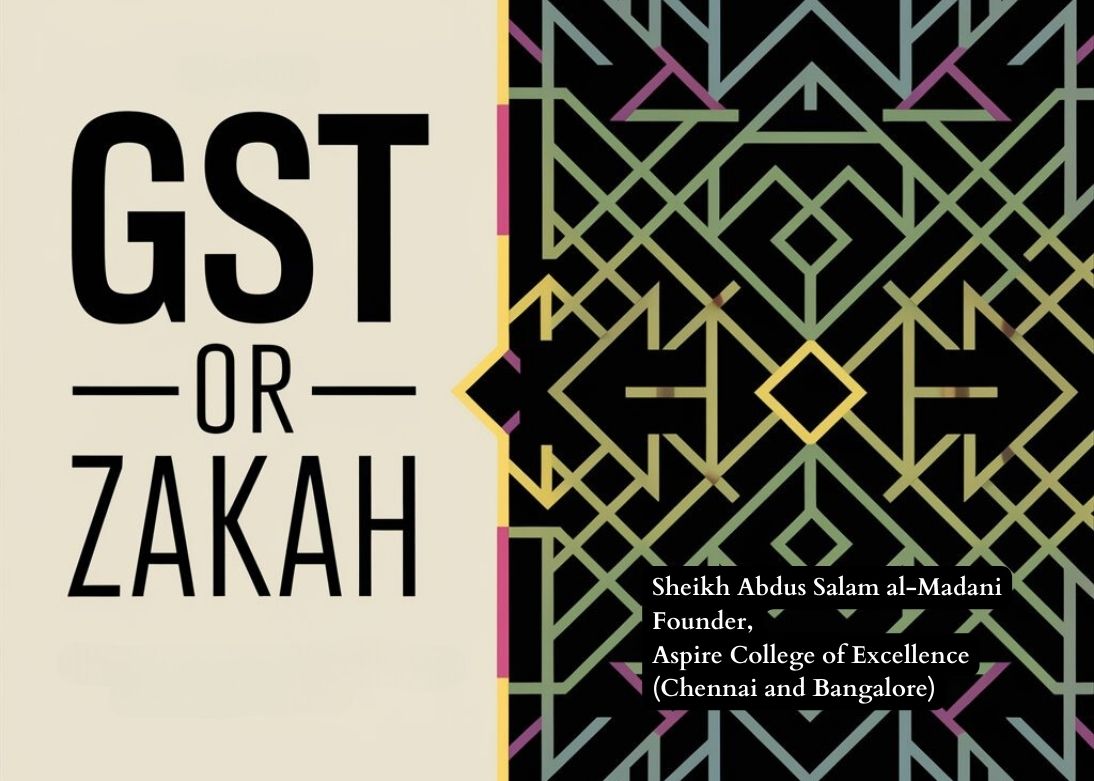
GST or Zakah
9 Apr 2024




